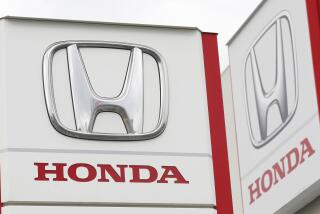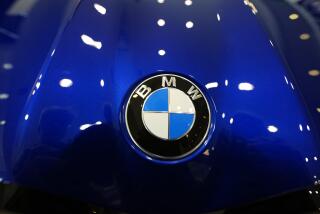BMW joins automakers recall for air bags that could spray shrapnel
BMW is recalling 42,000 of its model year 2002 and 2003 3-series cars because of front-passenger-side air bags that may not inflate properly in a collision, the automaker said Monday.
BMW is the latest to join a group of five other automakers that have recalled more than 3 million vehicles because of the air bag problem, which could spray shrapnel around the cabin in a crash.
“We have not had a single case of a reported failure in our cars, but it is the same problem, yes,” said BMW spokesman Julian Arguelles, in an interview.
PHOTOS: Kelley Blue Book’s top 10 green cars for 2013
The defect stems from faulty manufacturing in 2001 and 2002 by Takata Corp., a Japanese company that made the explosive wafers that power the lightning-quick inflation of air bags.
Honda, Nissan, Toyota, Mazda and General Motors have been included in the recalls, which affected cars produced from 2002 to 2004.
During all this time there appeared to be only six reported incidents on the road -- four in the United States and two in Japan -- and another six at Japanese salvage yards dismantling cars. There were no reported injuries.
The faulty fabrication of the wafers occurred at Takata’s factories in Moses Lake, Wash., and Monclova, Mexico.
A similar defect in parts produced by Takata that cropped up previously involved driver’s side air bags and has killed several people.
Dave Buchko, who handles advanced powertrain and heritage communications for BMW, described the defect.
“In some cases, the accelerant used in these air bags may not be to specification,” Buchko said, later adding that a “condition of excessive internal pressure” could develop.
BMW said that car owners would be contacted via first-class mail to inform them about the recall.
When replacement parts are available, owners will be contacted to make appointments to have the air bags replaced.
The BMW owners can call (800) 525-7417 or email the company here.
ALSO:
Porsche unveils 2014 911 models
Competition for truck buyers heats up
Tesla drives California environmental credits to the bank






